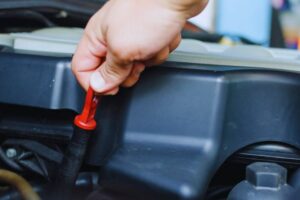If you see an oil leak under your car, it could be a sign that there’s something wrong with its engine. Taking your car to the mechanic might result in a substantial repair bill. But if you know how to fix an oil leak, you can do it yourself and save money.
Fixing a leak yourself is possible if the cause is not that serious. One easy way is to use a high mileage oil blend or a stop leak additive. These stop-leak products can soften the rubber seals of your car. They will also condition the gaskets to stop the leak and prevent the possible occurrence of other automotive leaks.
If you use these products, you may also need to drive your car a few hundred miles before the leak is fully sealed. It takes this long to seal the leak because it typically occurs at the oil pan gaskets, the valve cover, the front and rear crankshaft seals, and the timing chain cover.
Read on to learn more about fixing an oil leak, what causes oil leaks, and the cost of fixing them.
How to Fix an Oil Leak
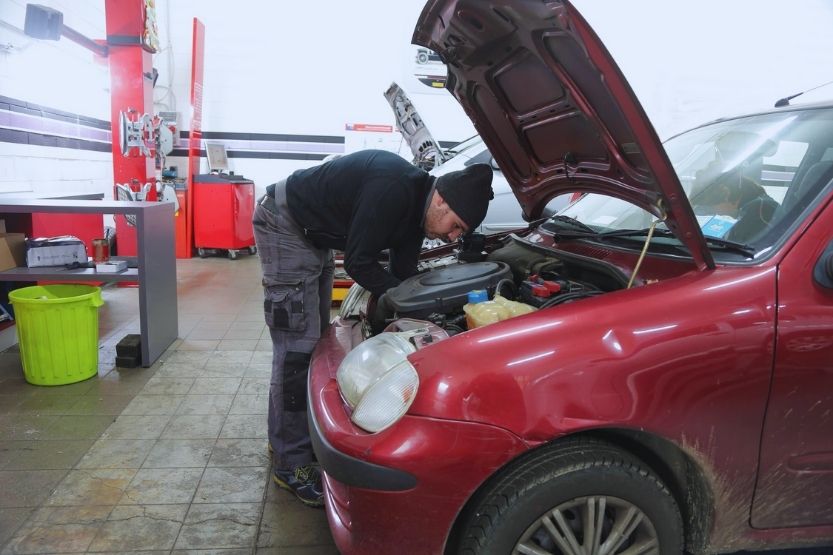
Use Products That Can Seal Leaks
You can fix an oil leak as long as the cause is not that serious. One easy way is to use products that seal leaks, such as a high mileage oil blend or a stop leak additive. These products will soften and condition the gaskets to seal the leak.
They can also prevent additional automotive leaks from forming. However, you may need to drive your car a few hundred miles before these products can completely stop the leak.
Common Location of Automotive Leaks
Most automotive leaks occur at the following places:
- Oil pan gaskets,
- Front and rear crankshaft seals,
- Timing chain cover, and
- Valve cover.
As your engine ages over time, its heat will cause the gaskets and seals to shrink and harden.
Causes of Oil Leaks
As you may have already guessed, the most common cause of oil leaks is damaged and worn-out gaskets and seals of the oil pan. Oil leaks can also occur because the oil pan’s drain plug was accidentally removed and is missing, or the valve cover gaskets are worn out.
Deteriorated Gaskets
Worn-out and deteriorated gaskets and seals will not perform their work. They wear out and worsen as your car grows old because of the heat they receive from the engine. If you use your car and frequently drive hundreds of miles at a time, it will deteriorate faster.
The gasket seals are a critical part of two engine metal parts like the joints between the engine block and the oil pan or the engine block and the cylinder heads. When they are damaged, they won’t seal the joined metal parts of the engine.
Oil Leak Can Occur While the Car Is Parked
Oil leaks can occur in several ways. An oil leak can even occur while your car is parked. This leak is commonly caused by bad oil seals and connections or damaged engine and oil pan gaskets. How easy or how difficult the repair will depend on the actual cause and condition of the oil leak.
Causes of Oil Leaks
The cause of automotive oil leaks is relatively easy to figure out. There are only four possible causes of this problem, and there are already several proven fixes to each of these problems:
1. Worn Out Engine Gasket
If you have an oil leak, this should be one of the first ones that you should look into because it is the most common cause of this problem. The engine gasket is supposed to seal the engine lubricants so they won’t leak.
But a break will occur in this gasket which then starts the oil to leak. This condition will eventually deprive the engine of its much-needed lubricant. The engine will eventually overheat, and its internal parts will stick to each other because of the heat that expands them. You will have a seized engine – a costly problem to fix.
2. Oil Pan Issues
The oil pan is the reservoir of the car’s motor oil. The motor oil settles here every time it completes its lubrication cycle. A leak can occur if its gasket is already worn out or due to small holes in the pan itself.
3. Bad Connections
The motor oil must pass through several tubes, hoses, or lubricating lines to lubricate the engine. These lines or tubes must be completely free of holes or damage so that the quantity of lubricating will remain steady.
But if there is damage to any part of this lubricating line, motor oil will surely leak. Not enough lubricating oil will circulate the engine. The engine suffers the most because it has the most internal parts running at tremendous speeds while driving your car.
4. Defective Oil Seals
Many oil seals protect your engine. They keep the lubricating oil where it is supposed to be. Oil seals also protect the engine’s internal parts from debris and dirt as you drive down the road. As you can see, a defective oil seal will compromise the performance and longevity of your engine.
When driving your car, its engine generates excessive amounts of heat. It is the motor oil that keeps its temperature in manageable conditions. Motor oil keeps things cool and lubricates the engine parts while driving your car. If it leaks, there’ll not be enough oil to cool down the engine while it’s running.
Why You Need to Fix the Leak Right Away
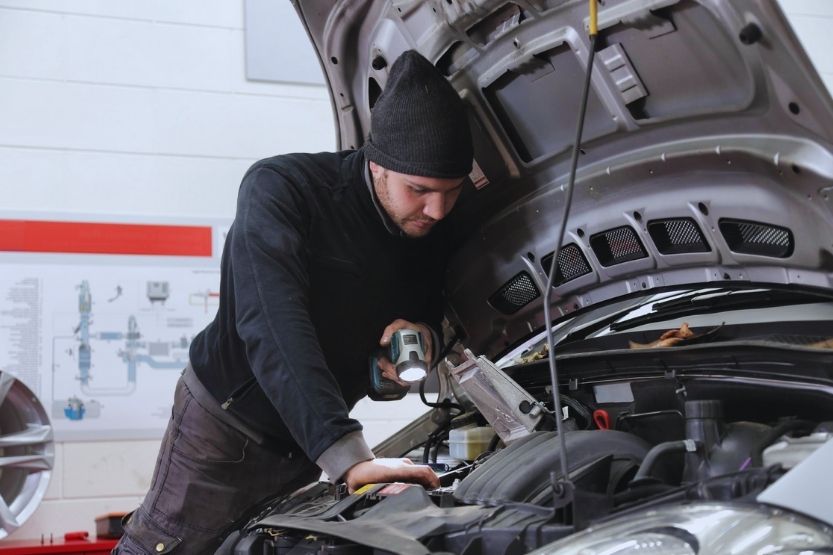
Causes Stains on the Garage Floor
If you leave these gaskets, seals, and hoses in their present degraded conditions, it will cause stains on your garage floor. Still, more seriously, it will adversely affect the operation and efficiency of the engine.
Might Cause Engine Fire
It’s also dangerous to have dirty oil leaks lying around your engine. They can cause engine fire if not corrected. But what usually happens when this problem is ignored is complete engine failure. That is why you can’t let this problem remain unsolved. You have to fix it right away.
Again, how to fix an oil leak? Get a stop leak additive or a high mileage oil blend to fix an oil leak. These products are capable of softening and conditioning rubber seals and thus preventing leaks. It will take some time before the leak can be fully sealed.
How to Determine the Location of Leaks
You know that oil leaks usually originate in the following engine parts:
- Engine gasket,
- Motor oil pan,
- Tubes and hoses, and
- Oil seals.
1. Check the Oil Pan’s Condition
So, start checking the condition of the oil pan. The parts of the oil pan that you need to check are its body, seals, and plug. Check if they are all intact, are properly installed, and there’s no damage whatsoever. If one of its parts is defective, change that part.
2. Check the Tubes and Hoses
Next, examine the connections or the tubes and hoses. Check if the hoses are still in good condition and have no cracks, splits, or holes. If one tube or hose is already worn out, replace it.
3. Check the Engine Gasket
Check the engine gasket. This is difficult because you have to remove the cylinder head before checking the engine gasket. You need to have this task done by a professional mechanic.
4 Examine the Engine Joints’ Seals
Examine the seals of the engine joints. Again, this is a task that a professional mechanic should perform because it involves opening the joined members of the engine. You need the proper skills and the right tools to do this job.
If you found the leak on the oil pan or the connections and could fix it successfully, there is no need to proceed to the third and fourth inspections. But if the first two inspections did not reveal the cause of the leak, you have to go through the third and fourth inspections if you want to put this problem behind your back.
Tips on How to Stop an Oil Leak
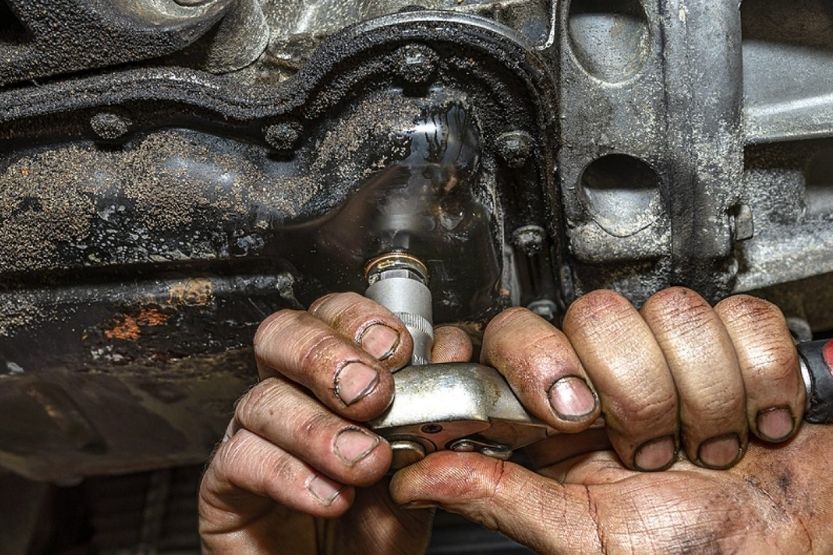
It’s not right to go straight to the mechanic to fix your oil leak problem. First, you need to locate the source of the leak. Perhaps the leak is not difficult to stop. There are many ways to stop oil leaks without requiring the help of a mechanic.
Tools and Materials
Of course, you will need the necessary tools to do the job. For starters, you need the following:
- Car jack,
- Jack stands,
- The right size of torque wrench,
- Replacement parts,
- Special additives for stopping leaks, and
- Cleaning rags.
Here are some tips on stopping an oil leak:
1. Stop the Leak with an Additive
Buy a high mileage oil blend or a stop leak additive. These products are good at softening and conditioning the rubber seals in your engine. They can also prevent future automotive leaks. But be patient. If you use this product, you may have to drive your car a few hundred miles before it can completely seal the leak.
2. Fix the Oil Pan
It is also a good idea to fix the problems of the oil pan first before resorting to using additives. This will shorten the time of the effectiveness of the additive:
- Jack up your car and put it on jack stands so you can crawl underneath it to access the oil pan.
- Check the body of the oil pan for holes or cracks. Fix these imperfections if there are any.
- Check the oil pan gasket too. You need to loosen its bolts before you can do this. If it’s already damaged, replace it.
- Examine the drain plug as well. Check if it is still intact and not corroded. Replace it as well if it is already broken.
- Finally, check the conditions of the bolts as well. Over time, these bolts will corrode, making leaks possible. So if the bolts are rusted, replace them. Make sure that all bolts are tightened adequately.
3. Fix the Connections
The next fix that you can do without a mechanic’s help is to fix the imperfections of the connections. Check the lines and hoses where the motor oil passes through. Look for cracks, holes, or splits. Buy the right sealing agent to seal the holes or cracks in the tubes and hoses.
If there are still oil leaks after performing any of these fixes, then the cause is beyond your ability to repair – if you are not a professional mechanic. Perhaps the problem originates in the cylinder head gasket or the seals on one of the joined metal parts of the engine. Professional mechanics can only fix these problems in a car service center.
Are Oil Leaks Expensive to Fix
1. Depends on How Difficult to Repair the Leak
The cost of fixing an oil leak depends on the actual problem and how easy or how difficult it is to repair. Replacing worn-out gaskets is relatively cheap. The bulk of the expense is labor cost. Most often, the cost of replacing the gaskets and the seals won’t go over $30.
2. Labor Cost
There are many things the mechanic has to do before replacing the gasket. That’s where the higher cost of labor comes in. The same goes with replacing a camshaft seal. It requires the removal of many engines internal parts before you can take out the defective seal and replace it with a new one.
3. Other Factors
So, to give you a general idea of the cost of fixing oil leaks, it may run from as low as $150 to as high as $1,200. Other factors that may affect this cost include the following:
- Type and make of your car,
- How difficult or easy it is to locate and fix the source of an oil leak, and
- Many sundry things in between.
Conclusion: How to Fix an Oil Leak
You can fix an oil leak if the cause is not that serious. An easy way to do this is to use a stop leak additive or a high mileage oil blend. These products are designed to soften your car’s rubber seals. They are also good for conditioning the gaskets to prevent further oil leaks.
However, you need to give these products some time before completely stopping the oil leak. You may have to drive your car a few hundred miles before this happens. If the leak comes from a faulty engine head gasket, you have to ask a professional mechanic to fix it.
Read next:

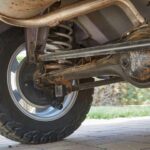
![Radiator Leak [Causes and How to Fix] Radiator Leak](https://roadsumo.com/wp-content/uploads/2021/12/radiator-leak-150x150.jpg)

![Transmission Fluid Leak When Parked [12 Causes and How to Fix] transmission fluid leak when parked](https://roadsumo.com/wp-content/uploads/2021/06/transmission-fluid-leak-when-parked-150x150.jpg)

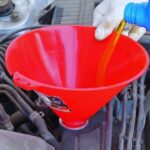
![Read more about the article Oil in Coolant [Causes and Solutions to Coolant in Oil]](https://roadsumo.com/wp-content/uploads/2021/10/oil-in-coolant-300x200.jpg)

